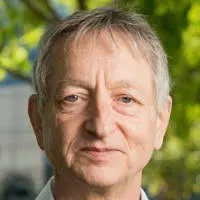 Yoshua Bengio
Yoshua BengioProfessor of the Department of Computer Science and Operations Research, head of the Montreal Institute for Learning Algorithms (MILA), CIFAR Program co-director of the CIFAR program on Learning in Machines and Brains, and Canada Research Chair in Statistical Learning Algorithms., Ph.D. - McGill University.
 Kees Schouhamer Immink
Kees Schouhamer ImminkPresident and founder of Turing Machines Inc., a Dutch-based research and consulting firm that contributes to science and technology., Ph.D. - Eindhoven University of Technology.
 Andrew Zisserman
Andrew ZissermanProfessor of Computer Vision Engineering in the Department of Engineering Science, University of Oxford, Ph.D. - Sunderland Polytechnic.
 Georgios Giannakis
Georgios GiannakisEndowed Chair in Wireless Telecommunications, and McKnight Presidential Chair in ECE Digital Technology Center, Director University of Minnesota, Minneapolis. Ph.D. - University of Southern California.
 Daphne Koller
Daphne KollerFormer Professor of Computer Science at Stanford University and a MacArthur Fellowship recipient. She is one of the founders of Coursera, an online education platform, and is founder and CEO of Insitro, a drug discovery startup. Ph.D. - Stanford University.
 Robert Schapire
Robert SchapirePrincipal Researcher at Microsoft Research in New York City, and a Visiting Lecturer in Computer Science at Princeton University. Ph.D. - MIT.
 Carlo Tomasi
Carlo TomasiThe Iris Einheuser Professor of Computer Science, Duke University. Ph.D. - Carnegie Mellon University.
 Vahid Tarokh
Vahid TarokhThe Rhodes Family Professor of Electrical and Computer Engineering, Duke University. Ph.D. - University of Waterloo.
 Bradley Efron
Bradley EfronMax H. Stein Professor and Professor of Statistics and of Biomedical Data Ssience at Stanford University. Ph.D. - Stanford.
 Yann LeCun
Yann LeCunSilver Professor of the Courant Institute of Mathematical Sciences at New York University, and Vice President, Chief AI Scientist at Facebook. Ph.D. - Université Pierre et Marie Curie, Paris.
Note: the following books are not recommended by Professor LeCun. They are books that have been used as reference texts in one/some courses he has taught.
 Christopher Manning
Christopher ManningThomas M. Siebel Professor in Machine learning, Professor of linguistics and computer science, Director, Stanford Artificial Intelligence Laboratory (SAIL), Associate Director, Human-Centered Artificial Intelligence Institute, Stanford University. Ph.D. Stanford.
Note: the following books are not recommended by Professor Manning. They are books that have been used as reference texts in one/some courses he has taught.
 Geoffrey Hinton
Geoffrey HintonEmeritus Distinguished Professor of Computer Science at the University of Toronto, and Director of Research at Google Research Brain Team. Ph.D. - University of Edinburgh.
Note: the following books are not recommended by Professor Hinton. They are books that have been used as reference texts in one/some courses he has taught.
 Victor Zue
Victor ZueDelta Electronics Professor of Electrical Engineering and Computer Science at Massachusetts Institute of Technology (MIT). Sc.D. MIT.
Note: the following books are not recommended by Professor Zue. They are books that have been used as reference texts in one/some courses he has taught.
 Michael Jordan
Michael JordanPehong Chen Distinguished Professor at the Department of EECS and Department of Statistics, University of California, Berkeley. Ph.D. University of California, San Diego.
Note: the following books are not recommended by Professor Jordan. They are books that have been used as reference texts in one/some courses he has taught.
 Daniel Weld
Daniel WeldThomas J. Cable / WRF Professor in the Paul G. Allen School of Computer Science & Engineering at the University of Washington, Ph.D. - MIT.
 William Freeman
William FreemanThomas and Gerd Perkins Professor of Electrical Engineering and Computer Science (EECS) at MIT, and a member of the Computer Science and Artificial Intelligence Laboratory (CSAIL), Ph.D. - MIT.
Note: the following books are not recommended by Professor Freeman. They are books that have been used as reference texts in one/some courses he has taught.
 Fei-Fei Li
Fei-Fei LiInaugural Sequoia Professor in the Computer Science Department at Stanford University, and Co-Director of Stanford’s Human-Centered AI Institute, Ph.D. - Caltech.
Note: the following books are not recommended by Professor Li. They are books that have been used as reference texts in one/some courses she has taught.
 Zoubin Ghahramani
Zoubin GhahramaniProfessor of Information Engineering at the University of Cambridge, he holds joint appointments at University College London and the Alan Turing Institute., Ph.D. - MIT.
Note: the following books are not recommended by Professor Ghahramani. They are books that have been used as reference texts in one/some courses she has taught.
 Ruslan Salakhutdinov
Ruslan SalakhutdinovUPMC professor of Computer Science in the Machine Learning Department, School of Computer Science at Carnegie Mellon University, Ph.D. - University of Toronto.
Note: the following books are not recommended by Professor Salakhutdinov. They are books that have been used as reference texts in one/some courses she has taught.
 Andrew McCallum
Andrew McCallumDistinguished Professor and Director of the Center for Data Science in the College of Information and Computer Sciences at the University of Massachusetts Amherst., Ph.D. - University of Rochester.
Note: the following books are not recommended by Professor McCallum. They are books that have been used as reference texts in one/some courses he has taught.
 Jurgen Schmidhuber
Jurgen SchmidhuberDistinguished Professor and Director of the Center for Data Science in the College of Information and Computer Sciences at the University of Massachusetts Amherst., Ph.D. - University of Rochester.
Note: the following books are not recommended by Professor Schmidhuber. They are books that have been used as reference texts in one/some courses he has taught.
 Vincent Vanhoucke
Vincent VanhouckeDistinguished Scientist and Senior Director of Robotics at Google., Ph.D. - Stanford.
Machine learning is a field of artificial intelligence that deals with the development of algorithms and statistical models that enable machines to learn from data and improve their performance without being explicitly programmed. It is a subfield of computer science and has applications across a wide range of industries, including healthcare, finance, transportation, and manufacturing.
There are several types of machine learning, including supervised learning, unsupervised learning, and reinforcement learning.
Supervised learning is the most common form of machine learning. It involves training a model on a labeled dataset, where the desired output is already known. This type of learning is used in applications such as image recognition, speech recognition, and natural language processing.
Unsupervised learning, on the other hand, involves training a model on an unlabelled dataset. The model is then used to identify patterns and structure in the data, which can be used for applications such as anomaly detection and clustering.
Reinforcement learning is a type of machine learning that is based on the idea of training a model through trial and error. It is used in applications such as robotics and game playing, where the model is trained to make decisions that maximize a reward signal.
Deep learning is a subset of machine learning, which uses artificial neural networks to model complex patterns in data. It is particularly useful in applications such as image and speech recognition, where the model is required to learn from large amounts of data.
Machine learning has a wide range of applications, including natural language processing, image recognition, speech recognition, fraud detection, and self-driving cars. It is also used in industries such as finance, healthcare, and transportation.
Machine learning models are trained on large amounts of data and use this data to make predictions or decisions. As the amount of data continues to grow, the ability of machine learning models to make accurate predictions and decisions is also increasing.
Finally, machine learning is a rapidly evolving field, with new techniques and technologies being developed all the time. It is expected to have a significant impact on many industries in the future and will continue to shape the way we live and work.





















